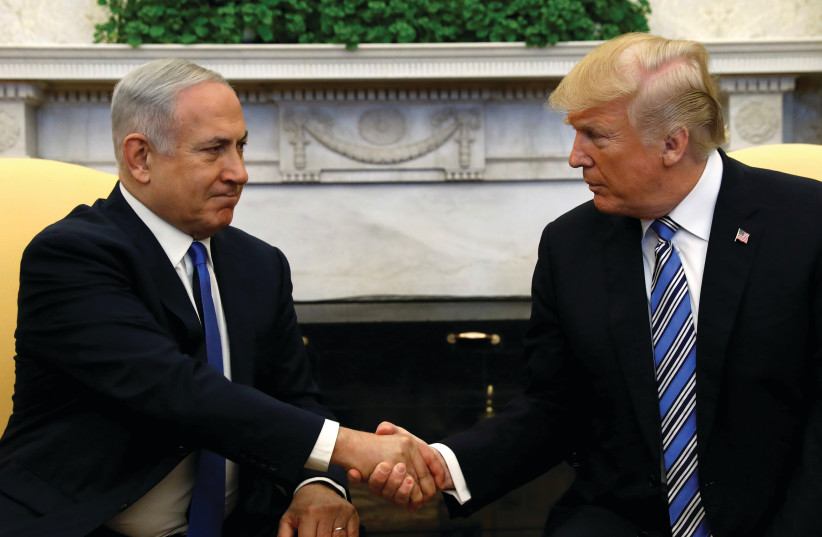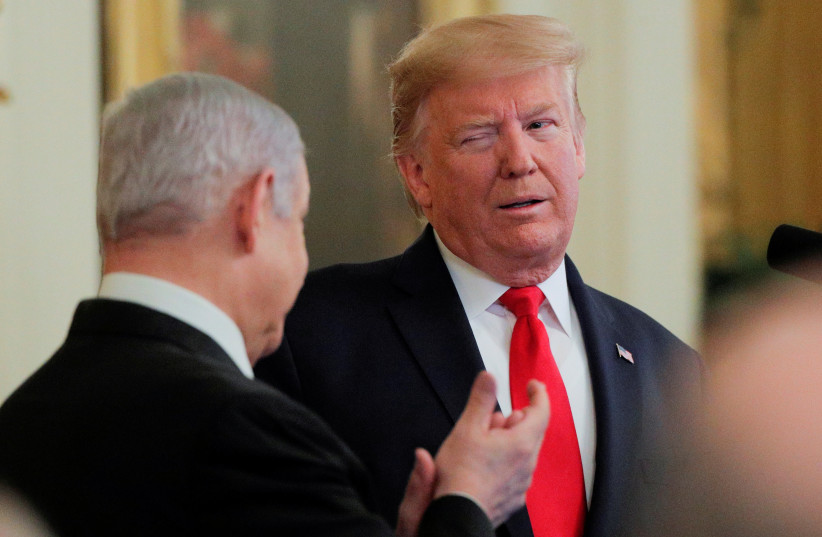Former president Donald Trump was arraigned this week on a 37-count criminal indictment that has clear implications for the security of the Jewish state.
Israel’s closely guarded secrets were among the earliest Trump handed over to a hostile foreign power. He’d been in office less than four months when he invited the Russian foreign minister and ambassador to the Oval Office.
Apparently trying to impress his visitors, and through them their boss, Vladimir Putin, with how important he had become, he boasted, “I get great intel. I have people brief me on great intel every day.” To prove it, he shared one of Israel’s critical secrets with his visitors, Russian Foreign Minister Sergei Lavrov, Russian Ambassador Sergei Kislyak and a Russian reporter (American journalists were not allowed in).
During that meeting, Trump also boasted to the Russians that relations could be smoother because he had just fired that “nut job,” FBI Director James Comey, who had been investigating Russian meddling in the 2016 election.
Trump leaked information that a covert operation by Israel’s counterterrorism unit and members of the Mossad had been able to “penetrate an Islamic State cell deep in Syria” and uncover evidence that the Syrian ISIS had developed bombs that could be concealed in laptop computers and undetectable by airport security, according to published reports.

Trump hadn’t cleared this leak with Israeli officials or even his own intelligence people, who rightfully feared Moscow would immediately share it with their allies in Iran and Syria.
Vanity Fair reported that as a result of the Israeli intel, the US and Britain banned laptops and other electronics on planes, particularly from certain countries, until they were able to improve detection measures.
Israeli intelligence officials were outraged and became more cautious about what they shared with the White House and the National Security Council. The NSC was already in turmoil with the firing of its director, Michael Flynn, for lying to the vice-president and other senior White House aides about his back-channel dealings with Kislyak.
Business Insider quoted former CIA officer Alex Finley saying that Trump’s action was “outrageous and reckless” and “moronic.”
The CIA was forced to extract a top-secret asset – a midlevel Russian official with access to Putin – who may have been compromised and in danger following Trump’s leak, according to Vanity Fair.
This was part of a larger concern about the sloppy handling of intel by the Trump White House. On one occasion he tweeted a highly sensitive satellite photo of an Iranian launchpad that even identified the super-secret spy satellite that took it, USA-224. The tweet revealed to the Iranians and the Russians how much higher resolution and quality our satellites were than previously known.
Vanity Fair also revealed that Israeli intelligence believed that “American intelligence agencies had come to believe that Russian President Vladimir Putin had ‘leverages of pressure’ over Trump,” and warned their Israeli counterparts to “be careful” with the new administration. The magazine quoted a senior Israeli military source saying, “Trump betrayed us.”
An unnamed American official expressed concern about disclosing highly classified intelligence to Trump, saying “He has no filter; it’s in one ear and out the mouth,” Reuters reported.
Prime Minister Benjamin Netanyahu, who had preferred Trump’s election, was reportedly unconvinced, at least at the time.
THAT WAS only the tip of the iceberg when it came to Trump’s reckless handling of this country’s – and our allies’ – most sensitive security secrets. Special counsel Jack Smith laid it out in a 49-page criminal indictment of the former president for mishandling classified documents, obstructing justice and making false statements.

The indictment charged Trump had revealed secret intelligence operations by an ally, showed off highly classified military plans, taken secret documents from the White House and failed to protect them. He stored them sloppily at his two golf resorts, Mar-a-Lago in Florida and Bedminster in New Jersey. It is unclear how much he continues to hold on to. Both clubs have extremely lax security and easy access.
The most damning passage in the indictment reads:
“The classified documents Trump stored... included information regarding defense and weapons capabilities of both the United States and foreign countries; United States nuclear programs; potential vulnerabilities of the United States and its allies to military attack; and plans for possible retaliation in response to foreign attack. The unauthorized disclosure of these classified documents could put at risk the national security of the United States, foreign relations, the safety of the United States military, and human sources and the continued viability of sensitive intelligence collection methods.”
Trump supporters chosen to ignore substance of charges
Many of Trump’s supporters have chosen to ignore the substance of the charges in favor of echoing the Republican frontrunner’s accusations that he is the target of political persecution.
GOP congressional leaders have attacked the indictment as the weaponization of the Justice Department and a threat to democracy. Neither they, nor Trump, were saying that when they were demanding Hillary Clinton be tossed in jail for her private email server. The problem with that is that Trump’s own Department of Justice, despite his intense pressure, found her handling of the emails was “sloppy” but not illegal.
Trump was indicted under a law that he signed in 2018 as president that was intended to punish Clinton, Newsweek reported. His own criminal case could have been avoided had he followed the law and returned all the documents or even later complied with the subpoenas.
In 2016, candidate Trump repeatedly declared, “In my administration, I’m going to enforce all laws concerning the protection of classified information. No one will be above the law.”
Except himself, apparently.
REPUBLICAN KVETCHING that indicting a former president is political persecution and anti-democratic is blatantly false.
Israel’s PM Netanyahu is currently on trial for bribery, fraud and breach of trust. Former prime minister Ehud Olmert went to prison for bribery and obstruction of justice. President Moshe Katzav was sent to jail for rape, sexual harassment and obstruction of justice.
Former French president Nicolas Sarkozy was convicted for illegal campaign financing and falsifying documents, and sentenced to prison. He’s serving house arrest. His predecessor, Jacques Chirac, was convicted of embezzlement
Brazil’s current president, Luis Inacio Lula da Silva, was convicted and served a year in prison. He ran for another term after getting out and was elected.
Other democratic countries, notably Italy, Brazil and South Korea, have gone through similar ordeals. In all those cases democracy survived – if not strengthened – by demonstrating accountability even at the highest levels. So can the United States.
Is there any way of knowing who had access to the material Trump purloined and its contents? Why did he take them and refused to return them? Those are just some of the questions that must be answered. Israel has a clear stake in the results. So does the United States, whose core democratic principles are threatened as never before.
The writer is a Washington-based journalist, consultant and lobbyist, and a former American Israel Public Affairs Committee legislative director.
